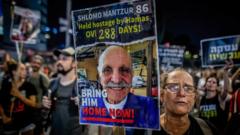In a significant development, Hamas has handed over the remains of four Israeli hostages in exchange for hundreds of Palestinian prisoners. This effort is part of a ceasefire agreement facing scrutiny as Israel conducts DNA tests to confirm identities. While the release of Palestinian prisoners sparked celebrations, the complicated dynamics of hostage negotiations continue to loom large over the conflict.
Hamas Returns Bodies of Israeli Hostages Amid Ongoing Ceasefire Negotiations

Hamas Returns Bodies of Israeli Hostages Amid Ongoing Ceasefire Negotiations
The exchange of bodies and prisoners marks a crucial yet somber phase in the Israel-Hamas conflict, as families await confirmation of their loved ones' fates.
Article Text:
Hamas has returned the bodies of four Israeli hostages who were taken during the violent outbreak on October 7, 2023. The remains, identified as those of Shlomo Mansour, 86, Ohad Yahalomi, 50, Tsachi Idan, 50, and Itzik Elgarat, 69, are now undergoing DNA testing by Israeli authorities. In a parallel move, Israel commenced the release of more than 600 Palestinian prisoners, with many greeted by euphoric crowds in the West Bank and Gaza.
This exchange represents the conclusion of the initial phase of a ceasefire agreement, which is set to expire on Saturday. While the bodies are suspected to be those of the aforementioned Israeli hostages, Israel awaits confirmation from DNA analyses conducted near the Israel-Gaza border, and later transported to a forensics lab in Tel Aviv.
Tensions flared last week when Hamas mistakenly returned the body of a Palestinian woman instead of Israeli hostage Shiri Bibas, igniting anger in Israel. Hamas has since clarified the situation, claiming that the misidentification was unintentional, and later handed over the correct body. Notably, the transfer of these remains was done discreetly, fulfilling Israel's demand for a private exchange, contrasting with earlier public ceremonies that often drew accusations from Israel of humiliation.
Prior to the latest releases, a Hamas representative disclosed that the handover was designed to avoid any potential delays by the Israeli authorities. Released Palestinian prisoners from Ofer Prison in the West Bank were seen entering a jubilant atmosphere, with the expectation that over 400 Gazans and several long-serving prisoners would be among those set free.
Notable among the hostages taken were Tsachi Idan, who was abducted from his home along with his family during the initial assault, and Itzik Elgarat, whose phone was traced back to Gaza post-kidnapping. Ohad Yahalomi was also taken from Nir Oz alongside his son, who was released during an earlier ceasefire. Families, particularly those of the deceased, are left to grapple with the heartbreaking news as the government intensifies its search for further resolutions.
This release marks a crucial moment before the ceasefire's deadline, raising questions about future negotiations for a next phase that may involve the release of remaining hostages and a larger number of Palestinian prisoners. Mediators are reportedly facilitating discussions as the situation remains volatile. In tandem with these developments, the grief in Israel has been palpable as families mourn lost loved ones, underscored by the recent funerals of hostages who tragically did not survive captivity.
As the world watches, the quest for peace amid intense regional turmoil continues, with the interlocking narratives of loss, hope, and the search for justice prevalent at each turn.
Hamas has returned the bodies of four Israeli hostages who were taken during the violent outbreak on October 7, 2023. The remains, identified as those of Shlomo Mansour, 86, Ohad Yahalomi, 50, Tsachi Idan, 50, and Itzik Elgarat, 69, are now undergoing DNA testing by Israeli authorities. In a parallel move, Israel commenced the release of more than 600 Palestinian prisoners, with many greeted by euphoric crowds in the West Bank and Gaza.
This exchange represents the conclusion of the initial phase of a ceasefire agreement, which is set to expire on Saturday. While the bodies are suspected to be those of the aforementioned Israeli hostages, Israel awaits confirmation from DNA analyses conducted near the Israel-Gaza border, and later transported to a forensics lab in Tel Aviv.
Tensions flared last week when Hamas mistakenly returned the body of a Palestinian woman instead of Israeli hostage Shiri Bibas, igniting anger in Israel. Hamas has since clarified the situation, claiming that the misidentification was unintentional, and later handed over the correct body. Notably, the transfer of these remains was done discreetly, fulfilling Israel's demand for a private exchange, contrasting with earlier public ceremonies that often drew accusations from Israel of humiliation.
Prior to the latest releases, a Hamas representative disclosed that the handover was designed to avoid any potential delays by the Israeli authorities. Released Palestinian prisoners from Ofer Prison in the West Bank were seen entering a jubilant atmosphere, with the expectation that over 400 Gazans and several long-serving prisoners would be among those set free.
Notable among the hostages taken were Tsachi Idan, who was abducted from his home along with his family during the initial assault, and Itzik Elgarat, whose phone was traced back to Gaza post-kidnapping. Ohad Yahalomi was also taken from Nir Oz alongside his son, who was released during an earlier ceasefire. Families, particularly those of the deceased, are left to grapple with the heartbreaking news as the government intensifies its search for further resolutions.
This release marks a crucial moment before the ceasefire's deadline, raising questions about future negotiations for a next phase that may involve the release of remaining hostages and a larger number of Palestinian prisoners. Mediators are reportedly facilitating discussions as the situation remains volatile. In tandem with these developments, the grief in Israel has been palpable as families mourn lost loved ones, underscored by the recent funerals of hostages who tragically did not survive captivity.
As the world watches, the quest for peace amid intense regional turmoil continues, with the interlocking narratives of loss, hope, and the search for justice prevalent at each turn.





















